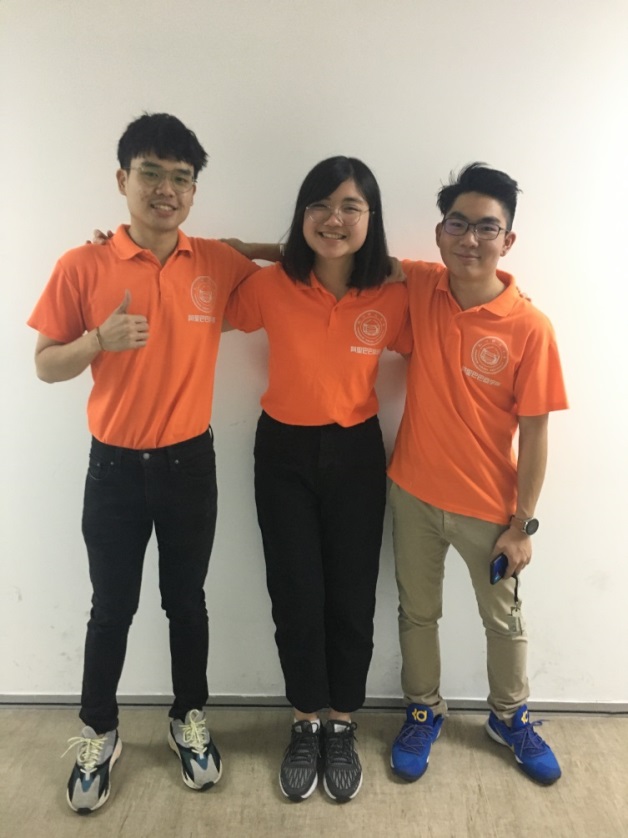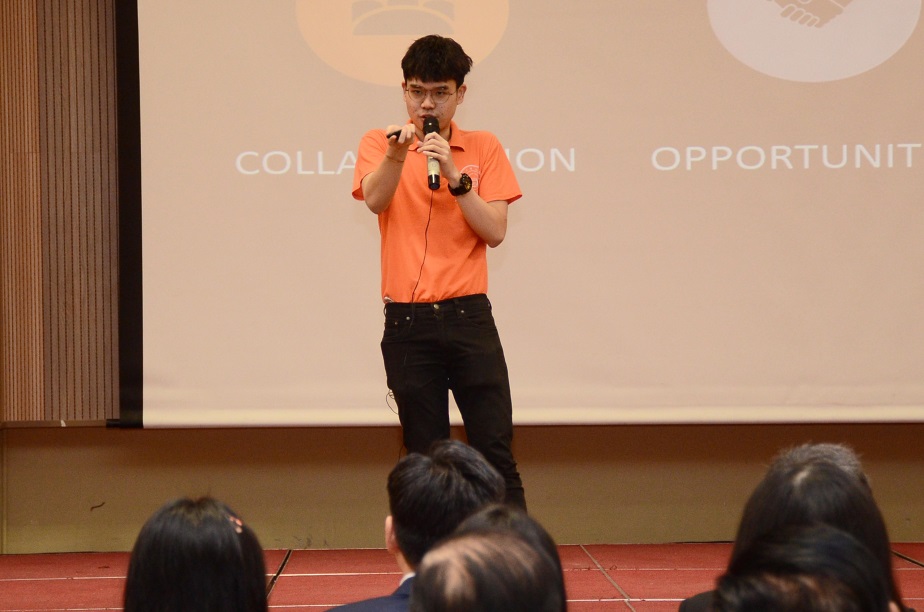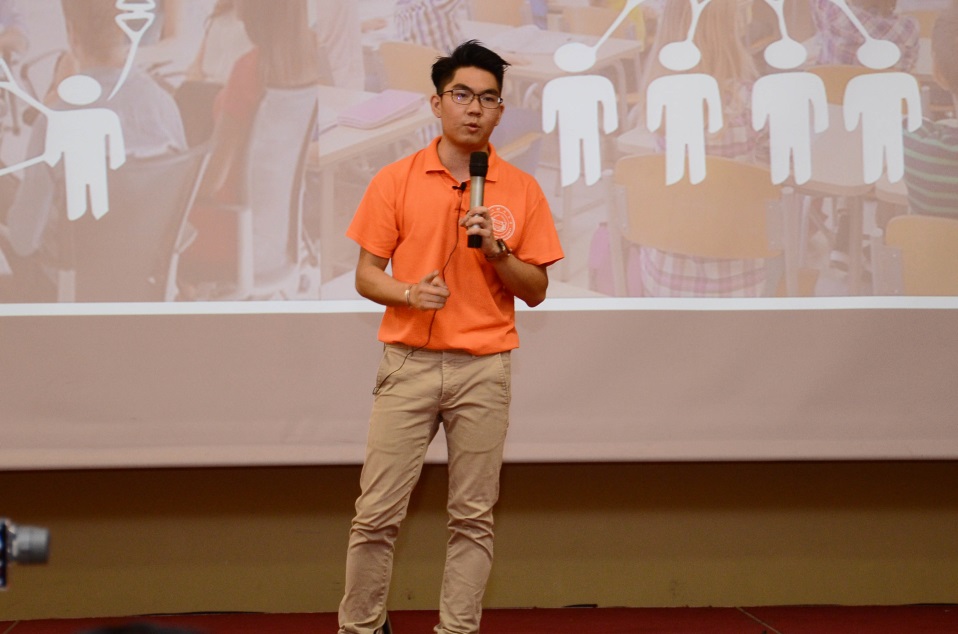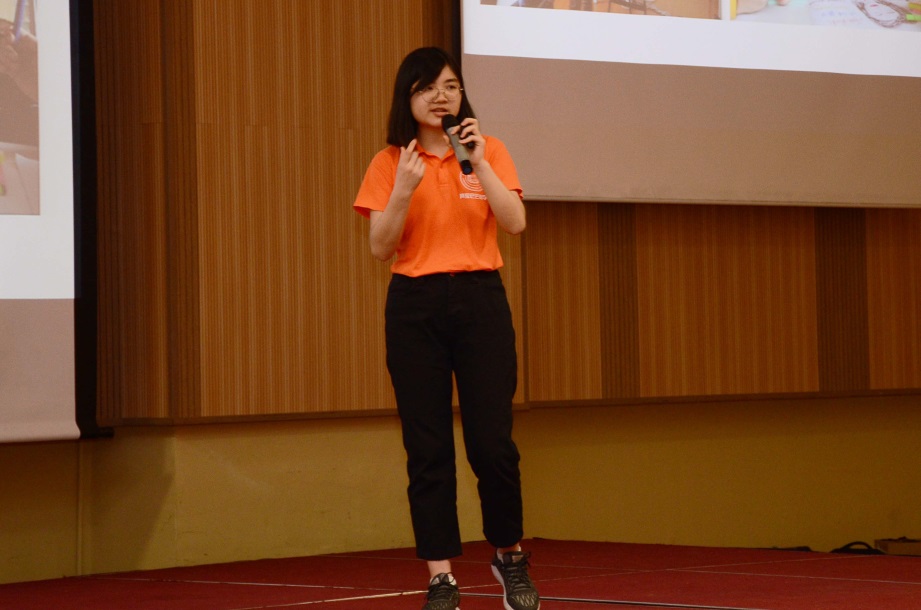
Alibaba Business School students shed light on e-commerce
With the support of Faculty of Accountancy and Management (FAM) and Lee Kong Chian Faculty of Engineering and Science (LKC FES), the Department of Soft Skills Competency (DSSC) of Sungai Long Campus organised UTAR New Village E-commerce Project and Alibaba Business School Sharing Session at Sungai Long Campus on 16 January 2020. The event aimed to provide a platform for the students to gain a better understanding of e-commerce and acquire the skills of becoming a successful entrepreneur.

From left: Loh Qi Hern, Loh Ning and Ooi Tru Men
Three Malaysian students, namely Loh Qi Hern, Ooi Tru Men and Loh Ning from Alibaba Business School were invited to the stage to share their experience and knowledge during the sharing session. They were Year One Semester One student, pursuing Bsc (Hons) Cross Border E-Commerce.

Loh Qi Hern explaining the convenience of e-wallet in China
Loh Qi Hern began his presentation by comparing the e-wallet systems in Malaysia and China. According to him, China has now transferred from an online payment platform to being a cashless society. “In China, everyone can pay for everything from taxi rides to baozi (dumplings) using an e-wallet. They even use e-wallet in the night markets. Everything becomes convenient with e-wallet,” he said and continued, “China’s famous e-wallet is called Alipay. Alipay is a third-party mobile and online payment platform that is owned by Alibaba Group.” Loh further added that the principle of Alipay is to create trust between the buyer and the seller. “The money will only be released to the seller when the buyer receives the item. This provides protection for the buyer and it will encourage them to use Alipay,” Loh explained.

Ooi introducing the Global eCommerce Talent Programme (GET) to the audience
The second presenter, Ooi Tru Men, presented the teaching and learning methods of the Global eCommerce Talent Programme (GET). GET, according to Ooi, provides an intensive learning platform for trainers, professors or students who are looking to develop an e-commerce course in their home country. The Alibaba Business School provides the framework and the resources to create a meaningful and effective class that will, in return, create capable and engaged entrepreneurs.
Ooi said, “In GET, andragogy method is used in teaching. There is no teacher-centred learning involved in this methodology. The teacher plays the role of a facilitator rather than a lecturer. The teaching focuses more on the process and less on the content. The teaching also emphasises on strategies such as case studies, role play, simulations, and self-evaluation. The classes usually involve lots of interaction as everyone is encouraged to share their knowledge and information in the classroom. GET also focuses on practical education. The students are brought to the sites to be involved in online and offline business projects. They are also exposed to the one-stop e-Commerce ecosystem by Alibaba Group.” One-stop e-Commerce ecosystem is Alibaba’s special innovation. This global platform provides resources that like data-driven network from sellers, marketers, service providers, logistics companies, manufacturers, entertainment, and corporate social responsibility.

Loh Ning sharing her life in Alibaba Business School
The third presenter, Loh Ning shared her study life experience at the Alibaba Business School. She started her presentation by introducing the Alibaba Business School in Hang Zhou, China. According to Loh Ning, the students in the business school are largely exposed to interactive learning and presentation which help to enhance their negotiation and presentation skills. Loh also said that experienced guest speakers are usually invited to give lectures and this enabled them to gain more knowledge in that field.
“The students are also given the opportunity to participate in Taobao Festival and ASPARA Conference by Alibaba Group. Taobao Festival is one of the hallmark events for Alibaba Group. It is an annual gathering for China’s most innovative entrepreneurs while ASPARA Conference is one of Alibaba Cloud’s largest annual events. The APSARA conference last year had attracted more than 75,000 technology innovators, technical experts, software engineers, and other specialists from 81 countries and regions around the world. The students are also brought to visit the Bainiu Village. Bainiu Village used to be a small village with less than 1,600 farmers. But in the past seven years, the village has become a hotspot for e-commerce startups, and it is now one of the famous “Taobao Villages” in China. The growth of Taobao villages by Alibaba had increased across China, enabling the penetration of e-commerce into so many rural communities,” said Loh Ning.
Click here to read on the overall event.
© 2020 UNIVERSITI TUNKU ABDUL RAHMAN DU012(A).
Wholly owned by UTAR Education Foundation Co. No. 578227-M LEGAL STATEMENT TERM OF USAGE PRIVACY NOTICE